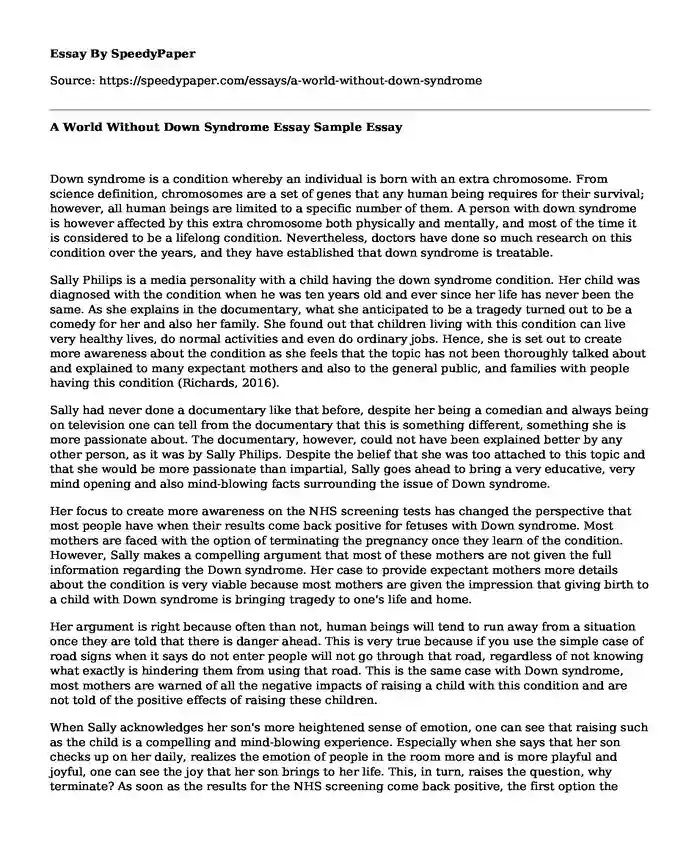Down syndrome is a condition whereby an individual is born with an extra chromosome. From science definition, chromosomes are a set of genes that any human being requires for their survival; however, all human beings are limited to a specific number of them. A person with down syndrome is however affected by this extra chromosome both physically and mentally, and most of the time it is considered to be a lifelong condition. Nevertheless, doctors have done so much research on this condition over the years, and they have established that down syndrome is treatable.
Sally Philips is a media personality with a child having the down syndrome condition. Her child was diagnosed with the condition when he was ten years old and ever since her life has never been the same. As she explains in the documentary, what she anticipated to be a tragedy turned out to be a comedy for her and also her family. She found out that children living with this condition can live very healthy lives, do normal activities and even do ordinary jobs. Hence, she is set out to create more awareness about the condition as she feels that the topic has not been thoroughly talked about and explained to many expectant mothers and also to the general public, and families with people having this condition (Richards, 2016).
Sally had never done a documentary like that before, despite her being a comedian and always being on television one can tell from the documentary that this is something different, something she is more passionate about. The documentary, however, could not have been explained better by any other person, as it was by Sally Philips. Despite the belief that she was too attached to this topic and that she would be more passionate than impartial, Sally goes ahead to bring a very educative, very mind opening and also mind-blowing facts surrounding the issue of Down syndrome.
Her focus to create more awareness on the NHS screening tests has changed the perspective that most people have when their results come back positive for fetuses with Down syndrome. Most mothers are faced with the option of terminating the pregnancy once they learn of the condition. However, Sally makes a compelling argument that most of these mothers are not given the full information regarding the Down syndrome. Her case to provide expectant mothers more details about the condition is very viable because most mothers are given the impression that giving birth to a child with Down syndrome is bringing tragedy to one's life and home.
Her argument is right because often than not, human beings will tend to run away from a situation once they are told that there is danger ahead. This is very true because if you use the simple case of road signs when it says do not enter people will not go through that road, regardless of not knowing what exactly is hindering them from using that road. This is the same case with Down syndrome, most mothers are warned of all the negative impacts of raising a child with this condition and are not told of the positive effects of raising these children.
When Sally acknowledges her son's more heightened sense of emotion, one can see that raising such as the child is a compelling and mind-blowing experience. Especially when she says that her son checks up on her daily, realizes the emotion of people in the room more and is more playful and joyful, one can see the joy that her son brings to her life. This, in turn, raises the question, why terminate? As soon as the results for the NHS screening come back positive, the first option the mothers are given is abortion. In her documentary, we can see her engage a woman who aborted her unborn baby because the fetus tested positive for down syndrome. During the interview with the woman, she tears up and breaks down because the subject is so close to her heart and she wouldn't understand why the unborn child was not given a chance to live. She, however, does not judge the woman for doing it but blames the limited information surrounding this topic.
Conclusion
In conclusion, the main reason Sally does this documentary despite putting her vulnerabilities on screen is to create awareness surrounding people living with down syndrome as discussed above. She accomplishes this mission because the documentary ends up raising critical conversation mainly on social media and this gives the condition more limelight as people are beginning to become more aware of it. Sally Philips accomplishes more through this documentary, and she can tap into the viewer's feelings and appeal to them, which is remarkable.
References
Richards, C. (2016). A World Without Down's Syndrome. BBC Television.
Cite this page
A World Without Down Syndrome Essay Sample. (2022, Nov 02). Retrieved from https://speedypaper.net/essays/a-world-without-down-syndrome
Request Removal
If you are the original author of this essay and no longer wish to have it published on the SpeedyPaper website, please click below to request its removal:
- Do Negative Political Campaigns Affect Democracy? Free Essay Provides the Answer
- Media Culture Essay Example
- Essay Sample: Foreign Exchange Market Analysis Report
- Essay on Financial Statements in the Manufacturing Sector vs. in the Services Sector
- Essay Example for You: Real-Time Reporting
- Free Essay with the Rhetorical Analysis of the Article, "Does Texting Affect Writing?"
- Essay Sample with World Issues Article Analysis
Popular categories





